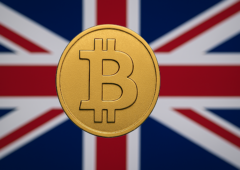Bitcoin Dips After Tariff News, But Institutional Buyers Step In
03.04.2025 16:30 2 min. read Alexander Stefanov
The cryptocurrency market faced a sharp decline after President Donald Trump announced new tariffs, triggering a sell-off that wiped out around $509 million in value.
Bitcoin took a hit, plunging to $82,352 as traders struggled to maintain the $83,000 support level. A brief bounce to $88,000 offered a glimmer of hope before the price slipped again, reflecting the uncertainty hanging over the market.
Other cryptocurrencies followed suit, with Ethereum dropping more than 6% and Solana declining by 6.6%. Although Bitcoin showed signs of stabilizing around $82,000, the ongoing selling pressure kept investors on edge. While some panicked, others took the downturn as a chance to make strategic moves.
Institutional players seemed largely unfazed by the turbulence. Bitcoin ETFs, which initially showed sluggish inflows, made a surprising comeback as big investors took advantage of the dip. Notably, Fidelity’s FBTC and Ark Invest’s ARK saw significant inflows of $119 million and $130 million, respectively, while BlackRock’s IBIT faced $116 million in outflows. This mixed response highlights a divide between cautious and bullish perspectives among institutional investors.
Despite the market’s volatility, large-scale buyers continued accumulating Bitcoin. Prominent companies, including those led by Michael Saylor and Japan’s Metaplanet, have been steadily boosting their holdings, signaling long-term confidence in the asset. Recent data shows that eight companies collectively acquired over 26,000 BTC last week alone, reinforcing Bitcoin’s growing appeal as a strategic investment.
The price swings did not dampen trading activity. On the contrary, Bitcoin’s trading volume surged by 85%, reaching $54 billion, as market participants took advantage of the fluctuations. Currently, Bitcoin is priced at around $83,394, maintaining a market cap of $1.65 trillion.
Analysts are now focusing on whether Bitcoin can break through resistance at $86,900 or if it might face further declines. The situation remains fluid, but the steady accumulation by major investors suggests they view Bitcoin’s long-term prospects positively despite short-term challenges.
-
1
UniCredit to Launch Structured Product Tied to BlackRock’s Spot Bitcoin ETF
01.07.2025 17:53 1 min. read -
2
Saylor’s Strategy Halts Bitcoin Buying After Historic Accumulation
07.07.2025 17:00 2 min. read -
3
Trump’s Two big Bitcoin Moves: Key Catalysts or Just Noise for BTC Price?
08.07.2025 7:30 2 min. read -
4
Bitcoin Market Stalls as Profit-Taking, Whale Dispersal, and Sideways Action Define the Cycle
01.07.2025 20:00 3 min. read -
5
Speculation Surges as Binance BTC Futures Volume Tops $650 Trillion
04.07.2025 17:37 2 min. read
Strategy Adds 6,220 BTC, Pushing Total Holdings Past 607,000
Michael Saylor’s Strategy has confirmed another major Bitcoin purchase, acquiring 6,220 BTC last week for approximately $739.8 million.
Bitcoin Open Interest Hits $42B as Funding Rates Signal Bullish Overextension
Bitcoin’s derivatives market is heating up, with open interest climbing back to $42 billion while funding rates continue to surge.
Tim Draper Predicts Bitcoin Will Replace U.S. Dollar
Tim Draper isn’t just betting on Bitcoin—he’s forecasting the death of the U.S. dollar.
UK to Sell Almost $7B in Seized Bitcoin as Treasury Eyes Crypto Boost
The United Kingdom’s Home Office is preparing to liquidate a massive cache of seized cryptocurrency—at least $7 billion worth of Bitcoin—according to a new report by The Telegraph.
-
1
UniCredit to Launch Structured Product Tied to BlackRock’s Spot Bitcoin ETF
01.07.2025 17:53 1 min. read -
2
Saylor’s Strategy Halts Bitcoin Buying After Historic Accumulation
07.07.2025 17:00 2 min. read -
3
Trump’s Two big Bitcoin Moves: Key Catalysts or Just Noise for BTC Price?
08.07.2025 7:30 2 min. read -
4
Bitcoin Market Stalls as Profit-Taking, Whale Dispersal, and Sideways Action Define the Cycle
01.07.2025 20:00 3 min. read -
5
Speculation Surges as Binance BTC Futures Volume Tops $650 Trillion
04.07.2025 17:37 2 min. read


